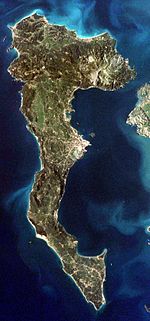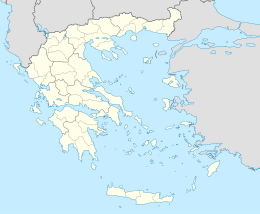Incidente de Corfu
| Incidente de Corfu | |||
|---|---|---|---|
 Corfu, uma das Ilhas Jônicas | |||
| Data | 29 de agosto de 1923 — 27 de setembro de 1923 | ||
| Local | Corfu, Grécia | ||
| Desfecho | Acordo entre a Itália e a Grécia sob os auspícios da Liga das Nações | ||
| Beligerantes | |||
| Comandantes | |||
O Incidente de Corfu foi uma crise diplomática e militar ocorrida em 1923 entre o Reino da Grécia e o Reino da Itália.
Contexto histórico[editar | editar código-fonte]
Houve um litígio fronteiriço entre a Grécia e a Albânia. As duas nações levaram a disputa para a Conferência dos Embaixadores que criou uma comissão de autoridades inglesas, francesas e italianas[1] - chefiada pelo general Enrico Tellini - para determinar os limites, que estava autorizada pela Liga das Nações para resolver a contenda. Desde o início das negociações, as relações entre a Grécia e a comissão se mostraram tensas. Além disso, o representante da Grécia abertamente acusou Tellini de trabalhar em favor das reivindicações da Albânia.[2].
Desenvolvimento do incidente[editar | editar código-fonte]
Em 27 de agosto de 1923, o general italiano Enrico Tellini e três de seus assistentes (o Major Luigi Corti, o Tenente Luigi Bonacini e um intérprete albanês) caíram em uma emboscada e foram assassinados por desconhecidos em Kakavia, próximo à cidade de Janina, em território grego.[3] Nenhuma das vítimas foi roubada[4].
Eles foram atacados, segundo algumas fontes, os jornais italianos e a declaração oficial da Albânia, por nacionalistas gregos;[5][6] enquanto outras fontes e a declaração oficial da Grécia, por bandidos albaneses.[7][8][9][10][11][12][13][14][15][16][17]
Reação italiana[editar | editar código-fonte]
A Itália enviou um ultimato à Grécia em 29 de agosto de 1923, exigindo 50 milhões de liras de reparações e a execução dos assassinos. A Grécia não foi capaz de identificar os assassinos, e as forças italianas bombardearam e ocuparam a ilha grega de Corfu em 31 de agosto de 1923, matando pelo menos quinze civis. A razão oficial para a invasão foi, sem dúvida, a posição estratégica de Corfu, na entrada do Mar Adriático.
Resolução da crise[editar | editar código-fonte]
A Grécia apelou à Liga das Nações, que inicialmente condenou a ocupação italiana. A disputa foi encaminhada à Conferência dos Embaixadores e a Itália aceitou sua decisão. A Conferência seguiu em grande parte as exigências italianas, ordenando que a Grécia pedisse desculpas e pagasse uma indenização, uma decisão que a Grécia concordou. As forças italianas se retiraram de Corfu em 27 de setembro de 1923.
Consequências[editar | editar código-fonte]
O principal motivo para a invasão era a posição estratégica de Corfu, na entrada do Mar Adriático.[18][19][20]
A crise mostrou que a Liga das Nações era fraca[21] e não poderia resolver disputas quando uma grande potência confrontava uma pequena.[22] A autoridade da Liga tinha sido abertamente desafiada pela Itália, um membro fundador da Liga e membro permanente do Conselho. Além disso, a crise mostrou o propósito e o tom da política externa fascista.[22]
A invasão de Corfu pela Itália foi o mais agressivo movimento de Benito Mussolini da década de 1920. A reputação de Mussolini foi reforçada na Itália.[23][24][25]
Referências
- ↑ «THE ITALO-GREEK CRISIS.». The Register (Adelaide, SA : 1901 - 1929). Adelaide, SA: National Library of Australia. 15 de Outubro de 1923. p. 11 "...a commission, consisting of English, French, and Italian officials, was engaged in this work on behalf of the Conference of Ambassadors."
- ↑ Brecher, Michael; Jonathan Wilkenfeld (1997). A study of crisis. University of Michigan Press (em inglês) 1 ed. [S.l.]: Ann Arbor. p. 583. ISBN 978-0-472-10806-0
- ↑ «Michael Brecher & Jonathan Wilkenfeld: A study of crisis». books.google.com
- ↑ Massock, Richard (2007). Italy from Within (em inglês). [S.l.]: READ BOOKS. ISBN 978-1-4067-2097-6
- ↑ Italy in the last fifteen hundred years: a concise history By Reinhold Schumann page 298 («1». books.google.com)
- ↑ «GREEK PLOT ALLEGED.». Kalgoorlie Miner (WA : 1895 - 1950). WA: National Library of Australia. 31 de agosto de 1923. p. 5 "The Italian newspapers declare that the murders were the result of deliberate ambuscade by Greeks—natives of Epirus, and will leave an indelible stain. The Albanian Legation in London has received a telegram from Tirana affirming that Greek armed bands were the assassins"
- ↑ «JANINA MURDERS.». Western Argus (Kalgoorlie, WA : 1916 - 1938). Kalgoorlie, WA: National Library of Australia. 18 de setembro de 1923. p. 24 "Colonel Botzari has returned from Epirus. He reports that the Greek enquiry leaves it beyond doubt that Albanians were the authors of the Janina murders."
- ↑ «REPORT ON MURDERS.». Western Argus (Kalgoorlie, WA : 1916 - 1938). Kalgoorlie, WA: National Library of Australia. 11 de setembro de 1923. p. 21"The officer in charge of the Epirus inquiry has returned to Athens. He thinks that the murderers were probabIy Albanians."
- ↑ «REPORT ON MURDERS.». Western Argus (Kalgoorlie, WA : 1916 - 1938). Kalgoorlie, WA: National Library of Australia. 11 de setembro de 1923. p. 21"It is reported that during the Greek investigation into the Janina outrage several objects dropped by assasins were discovered. It is alIeged that these clues point to the guilt of Albanians having their headquarters at Scutari."
- ↑ «The Brisbane Courier.». The Brisbane Courier (Qld. : 1864 - 1933). Qld.: National Library of Australia. 11 de setembro de 1923. p. 4 "...a deed that probably was committed by Albanian brigands."
- ↑ «The Brisbane Courier.». The Brisbane Courier (Qld. : 1864 - 1933). Qld.: National Library of Australia. 11 de setembro de 1923. p. 4 "So far there is no proof that the crime was committed by a Greek, the inference being that it was done by a band of Albanian bandits who infest the mountains in that neighbourhood."
- ↑ «ALBANIAN ACTION.». Western Argus (Kalgoorlie, WA : 1916 - 1938). Kalgoorlie, WA: National Library of Australia. 11 de setembro de 1923. p. 21 "the attitude of Albania tends to confirm the Greek contention that the murders may have been Albanian bandits on the Greek side of the border."
- ↑ «Albania's Captives.» Pyrrhus J. Ruches. Argonaut, 1965 p. 120 "He had no trouble recognizing three of them. They were Major Lepenica, Nevruz Belo and Xhellaledin Aqif Feta, alias Daut Hohxa."
- ↑ «ALBANIANS BLAMED.». The Daily News (Perth, WA : 1882 - 1950). Perth, WA: National Library of Australia. 31 de agosto de 1923. p. 7 Edition: THIRD EDITION "The Governor-General of Epirus, the Greek Delegation, and the Roumanian Consul in Janina, attribute the Telini crime to Albanians."
- ↑ «MURDERED ITALIANS.». Recorder (Port Pirie, SA : 1919 - 1954). Port Pirie, SA: National Library of Australia. 17 de setembro de 1923. p. 1 "The Exchange correspondent at Athens says the Court of Inquiry into the Janiria murders puts forward a suggestion that the Italian delegates were killed as an act of vengeance because during the Italian occupation of Vairona Colonel Tellini as antiGovernor had several Albanians shot, including notables."
- ↑ «BOMBARDMENT OF CORFU.». Morning Bulletin (Rockhampton, Qld. : 1878 - 1954). Rockhampton, Qld.: National Library of Australia. 1 de outubro de 1935. p. 6 "...the Greek Government felt there was reasonable doubt respecting the identity of the murderers, such doubt being based upon two notes to the Government of Albania respecting the operations in that country of a band of brigands."
- ↑ Duggan, Christopher (abril 2008). The Force of Destiny: A History of Italy Since 1796. [S.l.]: Houghton Mifflin Harcourt. p. 439. ISBN 0618353674 "...the killers (who had never caught) had almost certainly come from Albania,..."
- ↑ «The Brisbane Courier.». The Brisbane Courier (Qld. : 1864 - 1933). Qld.: National Library of Australia. 11 de setembro de 1923. p. 4"... because there is not the slightest doubt that the real cause of trouble is that old disturbing "Adriatic question " which has been the cause of many Balkan troubles, and is likely to be the cause of many more."
- ↑ «The Register. ADELAIDE: MONDAY, SEPTEMBER 24, 1923.». The Register (Adelaide, SA : 1901 - 1929). Adelaide, SA: National Library of Australia. 24 de setembro de 1923. p. 6 "But, though deprived of a base which would have made her control of the Adriatic more secure,..."
- ↑ «LEAGUE CHALLENGED.». The Argus (Melbourne, Vic. : 1848 - 1956). Melbourne, Vic.: National Library of Australia. 6 de setembro de 1923. p. 9 " It was recently predicted that Signor Mussolini was seeking a pretext to annex Fiume, despite, the Treaty of Versailles, but, thanks to the murders of the Greek territory, he found an opportunity of seizing Corfu, which is even more coveted by Italy than Flume, because it would enable her to close the Adriatic. "
- ↑ O’Connell, Ciaran. GCSE History Paper 1 Revision Guide. [S.l.: s.n.] p. 15
- ↑ a b Guide to International Relations and Diplomacy. [S.l.: s.n.] 2004. p. 214. ISBN 978-0826473011
- ↑ Jaques, Tony (novembro 2006). Dictionary of Battles and Sieges: A Guide to 8,500 Battles from Antiquity through the Twenty-first Century. [S.l.]: Greenwood. p. 262. ISBN 978-0313335372 "...,enhancing the reputation of Mussolini, who then annexed Fiume"
- ↑ Burgwyn, James (abril 1997). Italian Foreign Policy in the Interwar Period: 1918-1940. [S.l.]: Praeger. p. 24. ISBN 978-0275948771 "Improvised and incoherent, Mussolini's gunboat diplomacy failed to add Corfu to Italy's possession, but it did successfully fulfill demagogic and propagandistic aims within the country."
- ↑ Neville, Peter (dezembro 2003). Mussolini. [S.l.]: Routledge. p. 93. ISBN 978-0415249904"There is no doubt that Mussolini's occupation of Corfu had widespread support at home."
Bibliografia[editar | editar código-fonte]
- Hearder, Harry (1963). A Short History of Italy. [S.l.]: Cambridge University Press. pp. 214–215
- Barros, James (1965). The Corfu incident of 1923: Mussolini and The League Of Nations. [S.l.]: Princeton University Press
- Seton-Watson, Christopher Seton-Watson (junho 1979). Italy from liberalism to fascism: 1870-1925. [S.l.]: Routledge Kegan & Paul. pp. 670–675. ISBN 978-0416189407
- C. C. Jardine (abril 1980). Mussolini and Italy (Modern Times). [S.l.]: Longman Group United Kingdom. pp. 29–30. ISBN 978-0582204263
- Burgwyn, James (abril 1997). Italian Foreign Policy in the Interwar Period: 1918-1940. [S.l.]: Praeger. pp. 23–24. ISBN 978-0275948771
- Brecher, Michael; Wilkenfeld, Jonathan (1997). A study of crisis. [S.l.]: University of Michigan Press. pp. 583–584
- Neville, Peter (dezembro 2003). Mussolini. [S.l.]: Routledge. pp. 92–93. ISBN 978-0415249904
- Goldstein, Erik; Langhorne, Richard (março 2004). «Corfu Incident, 1923». Guide to International Relations and Diplomacy. [S.l.]: Bloomsbury Academic. p. 214. ISBN 978-0826473011
- Gooch, John (dezembro 2007). Mussolini and his Generals: The Armed Forces and Fascist Foreign Policy, 1922-1940. [S.l.]: Cambridge University Press. pp. 45–47. ISBN 0521856027
- Duggan, Christopher (abril 2008). The Force of Destiny: A History of Italy Since 1796. [S.l.]: Houghton Mifflin Harcourt. pp. 439–441. ISBN 0618353674
- Παπαφλωράτος, Ιωάννης Σ. (2009). Η Ελληνοϊταλική κρίση του 1923 Το επεισόδιο Tellini/ Κέρκυρας [The Greco-Italian crisis of 1923 The incident Tellini / Corfu] (em grego). [S.l.]: Σάκκουλας Αντ. Ν. ISBN 9789601522388
- Gilbert, Mark F.; Nilsson, Robert K. (abril 2010). The A to Z of Modern Italy. [S.l.]: Scarecrow Press. p. 114. ISBN 978-0810872103

